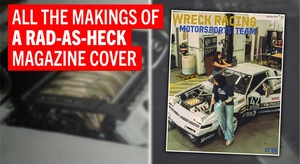
I left my mom's old bugeye Impreza (1.6L, front discs and rear drums) at a shop for a front brake pad change. The guy there did the old "force the fluid back into the MC with a big vice on the caliper pistons" thing and since then it's been hell to try to get these brakes to work. The brake pedal almost goes to the floor and generates very little braking force in the process, even when applying massive 2-foot pedal pressure plus vacuum boost. So far we've replaced:
- Brake MC
- Proportioning valve
- Rear brake cylinders (these were definitely blown out)
- Brake booster
The MC and rear cylinders were confirmed to have the same bore as the parts they replaced. ABS is nonfunctional on this car due to one or more failed wheel sensors.
I'm thinking that this car must have an ABS accumulator somewhere, and one of the isolation valves might've failed, causing much of the brake pressure and fluid volume from the MC to be wasted in pressurizing the accumulator. Does that make sense? Any other ideas?
Abs valve can get stuck closed too, meaning you are getting no pressure except to the rear drums for example. You shouldnt see much pedal travel in that case however, unless the line that isn't blocked by the abs isn't bled.
Can you get fluid at all 4 corners when bleeding? Did the mechanic damage the brake lines via crimping? If the brake line is damaged it may not be letting any fluid through, and also may not bleed correctly leaving a giant air bubble.
Fyi: I've fixed stuck abs valves before with a few solid hammer whacks and a jumping of the abs pump motor relay.
Brakes are bleeding fine at all corners and have been bled profusely, I don't think any brake line crimping was done but I'll ask. I'm defintely getting some action at the front brakes.
Drum shoes out of adjustment will eat a E36 M3-ton of pedal travel.

Opti
HalfDork
8/12/18 9:04 p.m.
When hunting a E36 M3ty pedal, and the obvious things have been check, I pinch off all the rubber lines. Pedal should be super hard.
If it's not you have an upstream problem.
If the pedal is hard, start dropping 1 clamp at a time. Pedal should get slightly softer each time, if you pull a clamp and the pedal goes super soft, your problem is on that circuit.
It's hard to say with everything you've touched it could be anything, I've seen bad masters out of the box, abs stuff causing weird issues, seized caliper slides making a pedal soft, and peices missing from the back of the master so the pushrod doesn't engage the master properly. I hope you find it, finding the weird stuff sucks
Opti's test method is the smartest thing I've never thought of.
You could have a torn caliper seal due to corrosion and forcing the piston back in.
The handbrake is at least as tight as it was before, so that suggests good drum shoe adjustment, if there was excess gap the handbrake should be loose right?
Closing off parts of the system could be helpful, if I close off all four before the brakes and still get any softness, that could confirm the problem is in the ABS system.
Both a rebuilt master and a brand-new master have been tried, the lines have been modified now to use the vastly more attainable LHD MC. Seized caliper slides could also be worth checking.
A torn caliper seal should cause a leak, right?
Update: So the rear shoe adjustment, caliper sliders, line condition and caliper seals have been ruled out, looks like ABS is the last remaining possibility.
Update: changing the combined ABS unit fixed it. Seems to have also fixed the infamous garbage ABS programming early bugeye models came with. Seems that the ABS error the car had for years was an error with this unit rather than a wheel sensor, it's gone now.

Vigo
UltimaDork
9/8/18 9:02 p.m.
Thanks for the update. Gotta congratulate you on your diagnostic thought process. Most people wouldn't piece together that accumulator theory at any point, let alone be right.
FWIW, this is a not uncommon problem on 3rd gen DSMs. A bore wears out in the ABS unit and fluid bypasses, causing a no-pedal situation that feels just like a bad master cylinder.

































